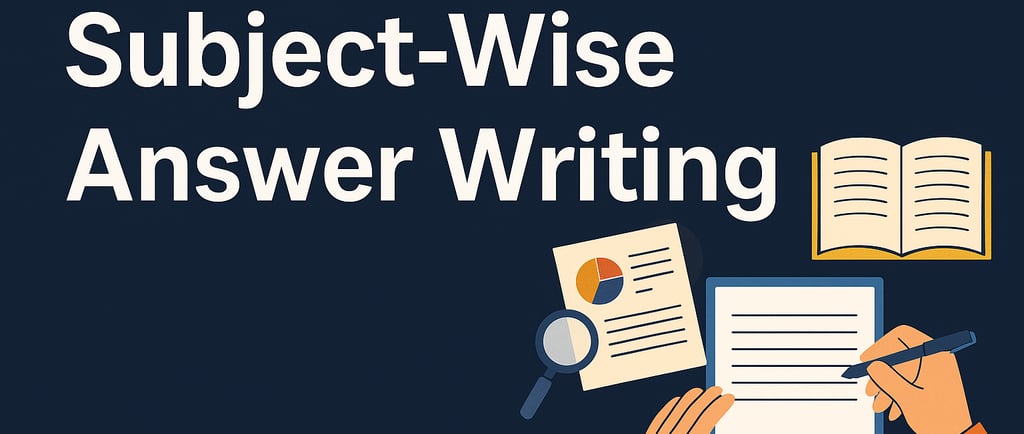Subject-Wise (Basic) Answer Writing Strategy For UPSC Civil Services (Main) Examination
Subject-wise answer writing is a high-impact strategy for UPSC Mains that goes beyond generic responses. It trains aspirants to adapt structure, language, and examples to each subject’s unique demands, integrate relevant dimensions, enhance presentation, and manage time effectively—transforming knowledge into precise, impactful answers that align with examiner expectations and boost scores.
UPSC BASICS
5/8/20244 min read


“The meaning of any text lies not in the work itself but in the reader's transaction with it.” - Louise Rosenblatt
Subject-wise answer writing is a crucial skill for excelling in exams that are descriptive in nature, such as UPSC/ PCS Mains or university exams. While a general structure applies to most subjects (Introduction, Body, Conclusion), the content, depth, and specific techniques vary.
It involves adapting the writing style, structure, keywords, presentation, and content to meet the specific and specialised demands of each subject. Having clarity in answer writing for each specific subject helps candidates to avoid very genric responses. It is about moving beyond rote learning to demonstrate a deep, analytical, and multi-dimensional understanding of each subject.
It's about effectively communicating your knowledge through well-structured, precise, and persuasive written responses. It ensures that the answers are aligned with the intent of each subject and the expectation of the particular subject expert examiner.
In simple terms, it’s not about writing "more"—it's about writing “what’s most relevant” for that particular subject. It's a reflection of an aspirant’s adaptability, comprehension, and exam-smartness.
Importance of Subject-Wise Answer Writing in UPSC Civil Services (Main) Examination
In the Civil Services (Main) Examination, we often see that even knowledgeable aspirants struggle to articulate their understanding effectively, which thereby impacts their overall performance in the Main examination. Against this, the dedicated practice of subject-wise answer writing plays an important role with numerous benefits for aspirants to score high in different papers. It includes:
# Addressing Subject-Specific Demands:
Subject-wise answer writing helps to understand and internalize subject-specific demands of unique vocabulary, analytical frameworks, and question patterns. For example:
Theoretical subjects like Ethics and optional papers often require theory-based answers, incorporating concepts such as utilitarianism and deontology-based ethics. In contrast, static subjects like History and Polity demand fact-based answers, emphasizing recall of specific data like historical event dates and chronology, constitution articles, etc. Meanwhile, dynamic subjects like the Indian Economy demand an understanding of economic principles and current trends.
# Writing Impactful Introductions & Conclusions:
This practice helps aspirants to write appropriate introductions and conclusions with subject-specific terminology & relevant contexts. For example:
In the History subject answers, the introduction might provide background historical context, while a Polity answer introduction could reference constitutional articles or recent judgments.
Similarly, for conclusions in History, one can summarize the long-term impact, legacy, or historical significance of the events discussed. While for Polity, a conclusion typically reiterates the constitutional principles, suggests a way forward, proposes reforms, or emphasizes the implications for governance and democracy.
# Integrate relevant dimensions:
It trains aspirants to automatically identify and integrate the relevant dimensions specific to each subject. This ensures your answers are comprehensive and insightful. For example:
History and Polity answers often demand weaving in social, economic, and/or political dimensions.
Ethics answers require drawing upon philosophical, psychological, social norms, or administrative principles.
# Enhancing Presentation:
It helps to refine the presentation for each subject, such as how & when to draw diagrams, graphs, flowcharts, and tables to enhance your answer's visual presentation. It also trains on how to use subheadings and bullet points to improve readability for specific question types and subjects. For example:
Economics: Graphical presentation of the Phillips Curve to show the relationship between inflation and unemployment.
Geography: Draw maps to pinpoint features like mountains or mineral regions.
# Refining Expression and Subject-Appropriate Language
It helps to refine expression and use language appropriately for each subject, ensuring your answers are precise and impactful.
History: Instead of generic terms, one will use specific language like "peasant uprisings," "rebellions," or "nationalist movements," depending on the historical context and nature of the conflict.
Ethics: Accurately applying terms such as "moral dilemma," "ethical conflict," or "conflict of interest" based on the specific context of case studies.
Indian Society & Social Issues: Employ concepts like the “Dual burden” and "Glass ceiling effect" to succinctly describe systemic discrimination faced by women and minorities in professional advancement.
# Subject-Specific Repository of Examples and Data for Content Enrichment:
It helps aspirants to build a strong reservoir of subject-specific examples, data, facts, case studies, committee reports, and government schemes. This content allows for substantiating points and arguments effectively in answers, moving beyond generic statements to provide concrete evidence. For example:
Ethics: Quoting relevant ideas from thinkers like Mahatma Gandhi on Trusteeship and John Rawls on Justice to support ethical arguments.
Polity: Referencing landmark Supreme Court judgments such as the Kesavananda Bharati case for Basic Structure and the Puttaswamy case for Right to Privacy.
Governance: Mentioning the government. initiatives like e-governance projects such as MyGov, Digilocker, or social welfare schemes such as PM Jan Dhan Yojana to illustrate policy implementation.
# Mastering Time & Word Limit Management:
It trains aspirants to quickly prioritize the most relevant and impactful points, ensuring they present crucial information efficiently within the given word limit and time constraints.
# Targeted revision & Improvement:
It empowers aspirants to accurately pinpoint their strengths and weaknesses within each subject and its specific topics. This clarity enables targeted revision and focused effort precisely where improvement is most needed.
In essence, subject-wise answer writing is not just a practice—it is a strategy that transforms knowledge into marks. It equips aspirants with the ability to adapt, refine, and present their thoughts in a manner that resonates with the specific expectations of each paper and examiner. By mastering this art, candidates move beyond generic responses to deliver answers that are sharp, relevant, and impactful.
In the fiercely competitive UPSC Civil Services Examination, this adaptability and precision can be the decisive factor between a good score and a top rank—turning preparation into performance, and performance into success.
Pariksha Punch
Empowering you through right guidance and resources.
Our Policies
parikshapunch@gmail.com
7042341210
Contact Us
Quick Links
Mentoring @ Rs 11
